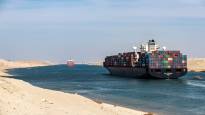The attacks by Iran-backed Yemeni Houthi rebels in the Red Sea have, among other things, increased the prices of freight transport.
China has asked Iran for help in curbing the Houthi rebels in Yemen, reports the Reuters news agency, citing four Iranian sources and one diplomatic source.
Discussions between China and Iran regarding attacks carried out by Houthi rebels in the Red Sea have taken place in several meetings both in the Chinese capital Beijing and in the Iranian capital Tehran.
Reuters’ Iranian sources refused to reveal who participated in the meetings and when the meetings took place.
– Basically, China said in the discussions that if their interests suffer in any way, it will affect the trade with Iran, says an Iranian source who remains anonymous.
According to the sources, Chinese representatives did not specify what the effects could be.
For about two months, the Iran-backed Houthi rebels have carried out airstrikes on cargo and warships in the waters near Yemen in the Red Sea as a protest against Israel’s military operations in Gaza. The attacks have increased the cost of sea freight on the shipping route, which is a key shipping route between Asia and Europe.
Suez sea traffic reduced by more than 40 percent
Cargo traffic passing through the Suez Canal has decreased by more than 40 percent since Yemen’s Houthi rebels began attacking ships, says the UN Trade and Development Conference UNCTAD.
– We are very concerned that the attacks on Red Sea freight traffic will increase tensions in international trade, said Jan Hoffmann, head of UNCTAD’s logistics department, at a press conference on Thursday.
About a fifth of the world’s container cargo passes through Suez. Compared to a year ago, the number of container ships at Suez has decreased by 67 percent.
The number of tankers has decreased by 18 percent and the number of vessels transporting bulk cargo by six percent.
About 20,000 ships, or 12–15 percent of international trade, pass through the Suez Canal, which connects the Red Sea and the Mediterranean Sea, every year.
Ships avoiding the channel have gone around the African continent from its southern side.
Sources: Reuters, AFP
